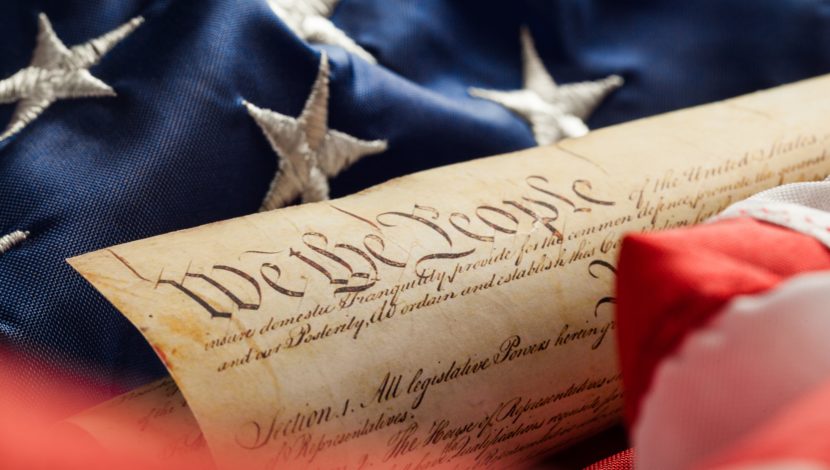The Unitarian Universalist Service Committee advances human rights through grassroots collaborations.
Three Things We Love About the 14th Amendment

By on October 30, 2018
In an interview released this morning, President Trump made his latest bid to sow fear and distract from the ongoing national conversation about the role his racist and xenophobic rhetoric has played in encouraging acts of hate and violence. His latest idea? To overrule the 14th Amendment by executive order, ending the Constitutional right to citizenship at birth.
Fortunately, Trump can’t actually do this, and the 14th Amendment is exactly the reason why. Its first sentence is clear: “All persons born or naturalized in the United States, and subject to the jurisdiction thereof, are citizens of the United States and of the State wherein they reside.”
This guarantee is one of the many things we love about the 14th Amendment. Today, instead of responding to Trump’s patently racist and absurd proposal, we thought we’d celebrate a few of the great things this Amendment adds to our Constitution.
1. The 14th Amendment keeps membership in the United States from being defined by race or ethnicity.
Before the 14th Amendment was adopted in 1868, citizenship in the United States was explicitly denied to African Americans, Asian Americans, and anyone else not considered “white.” In 1857 the U.S. Supreme Court notoriously held that black people could not be citizens under the Constitution and the first major immigration law passed by the U.S. Congress restricted naturalized citizenship to “free white persons.”
By making citizenship automatic for all people born in the United States, the 14th Amendment helped the United States move from being a white supremacist ethno-state toward becoming a genuine multiracial democracy. When politicians attack birthright citizenship, they are targeting and endangering precisely this legacy.
2. The 14th Amendment says state governments cannot violate human and civil rights.
Many people know that the Bill of Rights offers some basic human rights guarantees for people in the United States. Less commonly known is that prior to the 14th Amendment, these rights only applied to the federal government. This meant that state governments could pass laws that denied equal rights or due process to people on the basis of race, gender, ethnicity, or national origin.
The 14th Amendment made Constitutional rights nationally binding for the first time on state governments, through something known as the Doctrine of Incorporation. This cleared the way for many future gains for human and civil rights in this country.
3. The 14th Amendment says that equal rights are for all.
While in many ways the U.S. government has sought to restrict the Constitutional rights of non-citizens and undocumented immigrants, the words of the 14th Amendment are plain. The amendment says that no state shall, “deny any person within its jurisdiction the equal protection of the laws.” This means that undocumented immigrants and non-citizens too have Constitutional rights.
U.S. courts have not always upheld this language in its fullest sense, but this clause has been used in several groundbreaking Supreme Court decisions to establish that people held in U.S. immigration detention or in off-shore military facilities have fundamental legal rights under the Constitution, regardless of their immigration status.
This week we celebrated the 200th anniversary of the birth of Frederick Douglass, one of the greatest abolitionists and icons of the struggle for racial justice in the 19th century United States. Douglass’s advocacy was instrumental in the passage of the 14th Amendment and in ensuring that it was written in such a way that it protected the rights of everyone in the country, including Asian Americans and immigrants.
In a famous speech about immigration he delivered in 1867, Douglass defending the vision of the United States as a multiracial and open society that should welcome immigration from all parts of the globe. It is a vision we must work to keep alive today. “There are such things in the world as human rights,” Douglass declared, and they are “external, universal, and indestructible.”
